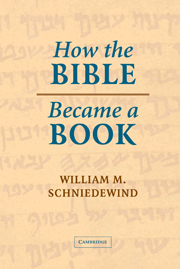Book contents
- Frontmatter
- Contents
- List of Figures
- Preface
- Abbreviations
- 1 How the Bible Became a Book
- 2 The Numinous Power of Writing
- 3 Writing and the State
- 4 Writing in Early Israel
- 5 Hezekiah and the Beginning of Biblical Literature
- 6 Josiah and the Text Revolution
- 7 How the Torah Became a Text
- 8 Writing in Exile
- 9 Scripture in the Shadow of the Temple
- 10 Epilogue
- Suggested Further Reading
- Notes
- Index
2 - The Numinous Power of Writing
Published online by Cambridge University Press: 16 July 2009
- Frontmatter
- Contents
- List of Figures
- Preface
- Abbreviations
- 1 How the Bible Became a Book
- 2 The Numinous Power of Writing
- 3 Writing and the State
- 4 Writing in Early Israel
- 5 Hezekiah and the Beginning of Biblical Literature
- 6 Josiah and the Text Revolution
- 7 How the Torah Became a Text
- 8 Writing in Exile
- 9 Scripture in the Shadow of the Temple
- 10 Epilogue
- Suggested Further Reading
- Notes
- Index
Summary
Writing had a numinous power, especially in pre-literate societies. Writing was not used, at first, to canonize religious praxis, but to engender religious awe. Writing was a gift of the gods. It had supernatural powers to bless and to curse. It had a special place in the divine creation and maintenance of the universe. According to one ancient Jewish tradition, the letters of the Hebrew alphabet as well as the art of writing were created on the sixth day (M. Avot 5:6). The idea that writing was given to humankind as part of the very creation of the world was known also in ancient Egypt and Mesopotamia. Writing was not mundane; rather, writing was used to communicate with the divine realm by ritual actions or formulaic recitations in order to affect the course of present or future events. According to Jewish tradition, the stone tablets given on Mount Sinai also were created on the sixth day. God himself writes on these two tablets with his very finger. Ancient Mesopotamia also described heavenly tablets (known as the Tablets of Destiny) in its creation myth, The Enuma Elish. According to biblical literature, God actually keeps a heavenly book, inscribed with people's names, which God adds to and erases thereby inscribing the eternal fate of those named. The books of Moses reflect this early notion of writing as supernatural. Such mysterious and numinous understandings of writing are typical of largely oral societies like early Israel.
- Type
- Chapter
- Information
- How the Bible Became a BookThe Textualization of Ancient Israel, pp. 24 - 34Publisher: Cambridge University PressPrint publication year: 2004



